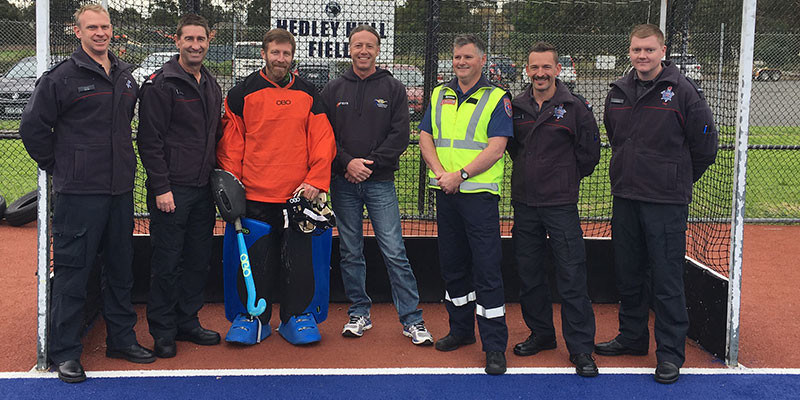Great save at Ashwood hockey field
July 15, 2016in Community News
When seasoned hockey player Darren Roberts took to the Hedley Hull field in Ashwood earlier this month, he had no indication that his life, as well as the game, was about to be in the balance.
The 46-year-old was taking a corner shot just meters away from the hockey goals when he collapsed in a sudden cardiac arrest on July 4 Remarkably, an anaesthetist from MonashHealth happened to be standing just meters away—being opposition goalkeeper, Mark Adams.

Survivor Darren Roberts (middle) was reunited today with the team of people who saved his life after he went into sudden cardiac arrest while playing hockey in Ashwood. MFB firefighters, anaesthetist Mark Adams from MonashHealth (orange goal-keeper uniform) and Ambulance Victoria MICA paramedic Rowan Harman (yellow vest).
Mark immediately began CPR on Darren, while trained firefighters and paramedics were dispatched to the case simultaneously as part of the Emergency Medical Response (EMR) program. Firefighters used a defibrillator, which can help shock the heart of someone in sudden cardiac arrest.
Ambulance Victoria Mobile Intensive Care Ambulance (MICA) paramedic Rowan Harman attended the hockey field alongside two Advanced Life Support paramedics and said the sight of everyone working together in an effort to save Darren’s life was great display of teamwork.
‘The fact that Darren is alive today is a real team effort. To see a bystander, firefighters and paramedics join together to save a life is simply a fantastic outcome,’ Rowan said.
‘Darren was extremely fortunate an anaesthetist happened to be near-by, however it’s important to know that in a case of someone who is in sudden cardiac arrest, anyone can step in and start CPR—in fact, it’s vital that they do.
‘For every minute CPR is not done on a person in cardiac arrest their survival rate can be reduced by 10 per cent.’
Paramedics transported Darren to hospital via road ambulance. Rowan was delighted to learn that Darren had since made a full recovery and was able to be reunited with him, firefighters and Mark in Ashwood just days after the incident.
Rowan said Darren’s close-call was a timely reminder for all sporting clubs to make sure they had an automated external defibrillator (AED) on-site and accessible.
‘Ambulance Victoria is actively encouraging organisations and sporting clubs to make sure they have a defibrillator, as you never know when it just might help save someone’s life,’ Rowan said.
‘This is a classic example of how important the ‘chain of survival’ is to help save the life of someone in sudden cardiac arrest.
‘The six steps in the ‘chain of survival’ are, early recognition of cardiac arrest, early access to emergency care (calling Triple Zero), early CPR, early defibrillation, early advanced care (paramedics) and definitive care (hospital).’
According to the latest Victorian Ambulance Cardiac Arrest Registry (VACAR) Annual Report, more bystanders than ever are stepping in to help save lives, if they see someone collapse in cardiac arrest.
The VACAR report released in February found that a record of 64 per cent of bystanders attempted CPR if they witnessed someone collapse in cardiac arrest. In 2005-2006 the rate was 35 per cent.
You can learn how to perform CPR through 4 Steps for Life Plus, a self-education program taught via a 20-minute DVD which involves practising the technique of performing CPR and becoming familiar with AEDs.
